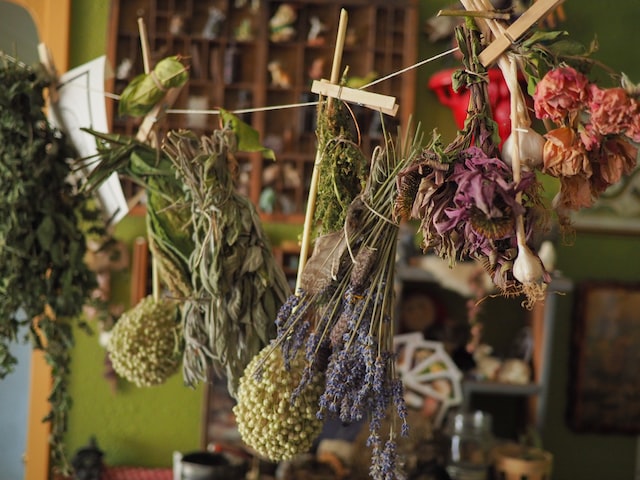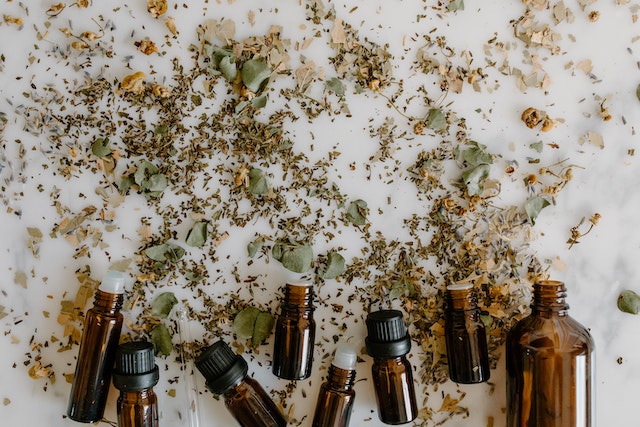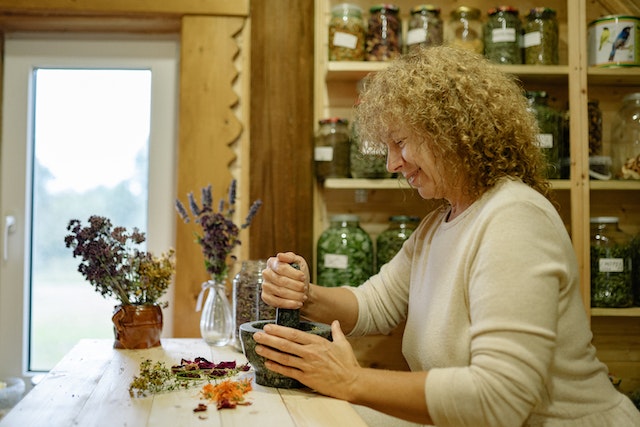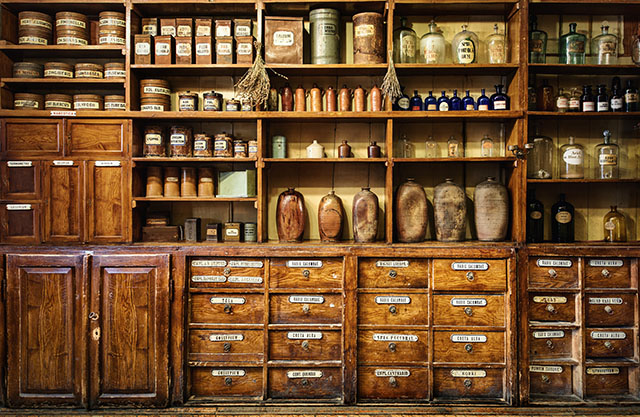Secrets of Plant Medicine
Nature Takes Care of All
Today, it seems that our busy and stressful lives take us further and further away from nature. When we have a headache, we reach for a bottle of headache pills, for a quick fix to the problem. And when we eat unhealthy foods and have an upset stomach, some Tums can take care of it. But, there was a time when all we needed for healing was found in nature.
Pharmaceuticals and manufactured medicines make up the majority of treatment methods today. Maybe you would be surprised to know that many of those still contain plant ingredients. So, why aren’t plant medicines being used more widely? Some time ago, wise women would harvest plants for all sorts of ailments and know exactly what to administer for various illnesses and conditions.
Have we lost this ancient healing knowledge?
On the podcast, I recently spoke with Nedda Elizabeth, an amazing clinical herbalist, based in Georgia. She experienced a significant positive impact on her life due to her use of plant medicine. During her journey of trying to find help with anxiety and mental distress, she discovered plant medicine. She decided to certify as a clinical herbalist and now supports those experiencing emotional distress and crises with alternative and holistic approaches.
“Nature itself is the best physician.”
- Hippocrates
Personally, I am a huge fan of plant medicine. That is not to say that allopathic medicine doesn’t have a place. But, I believe, like Nedda Elizabeth and many others, that plant medicine is complementary to conventional medicine and could be a first-line approach. I was very excited to learn more about how plant medicine and herbalism might aid in recovering from trauma or mental distress.
What is plant medicine?
Herbalism is the practice of studying and utilizing plants for their potential health benefits. The term "herb" refers to any component of a plant, from the roots to the flowers that grows freely in this natural world. People used natural medicines for thousands of years and until recently they were the only remedies available. Even just a hundred years ago, most people in the countryside knew about the healing powers of plants and were quite skilled in plant medicine.
Plant medicine uses plants to treat illness and preserve or improve general health and well-being. The general philosophy behind plant medicines is to help the body regain its natural equilibrium to cure itself. Medicinal plants have been around for thousands of years, and different plants have been used for different purposes in different ancient cultures.

Plant medicines may contain entire plants made from plant parts, such as leaves, roots or flowers; or fungi (mushrooms). Therapeutic plant products may be called herbal medicines, botanical products or supplements. In addition, there are also different ways of preparing plant medicines, which can include tinctures, infusions, decoctions, and more.
Although many conventional medications are effective in treating illnesses, they often have undesirable side effects. More and more people are looking for gentler ways to encourage their bodies to heal and feel well. Plant medicine offers an answer to many ailments and can be used safely and effectively with someone who is trained. A word of common sense here that just because something is plant-based or natural does not mean it has no effect. Plants can be poisonous or have dangerous effects, which is why you should always work with a professional herbalist.
Plant Medicine and Mental Health
Considering the mind-body connection, our physical and mental health is inextricably linked. Anything that is used for our physical body can affect our mental health and vice versa; however, there are several plants and fungi that are specifically known for supporting a stable mood and emotional well-being.
Whether you are dealing with depressive symptoms, insomnia, anxiety, or any other mental distress, knowing the premise of particular plants becomes the basis of the healing journey. Herbs can provide a very different approach to dealing with stress, for example. They are filled with vitamins, minerals, and certain substances that support and enhance health and well-being. Herbs tend to nourish the body to assist it organically and increase the body's intrinsic ability to manage stress and trauma (Cass, 2003). In contrast, psychiatric medicines typically produce a fast shift in awareness by altering neural pathways.

Herbs can be an effective supplement on this road to holistic healing. They provide a deeper, calmer, and ultimately healthier approach to healing, in addition to working with the mind-body link. Since 2000, recent studies from NYU and Johns Hopkins have demonstrated effectiveness for treating persons with anxiety, OCD, addiction, and end-of-life sadness (Johns Hopkins Medicine, 2020).
Some studies have discovered advantages to inhaling the aroma of plant extracts. This can be achieved with essential oils, for example. Researchers at the Federal University of Sergipe in Brazil investigated the impact of sweet orange essential oil in one study (Goes et al., 2012). The participants in the essential oil group did not exhibit increased anxiety, whereas the two control groups did.
Working with a Clinical Herbalist
A clinical herbalist guides people through plant medicine and other holistic healing methods. Working with a clinical herbalist, you can find natural, non-pharmaceutical remedies for issues like anxiety and depressive symptoms, and other common physical ailments (Winston, n.d.). You can meet with a clinical herbalist for a consultation, discuss your health objectives, and develop a strategy for incorporating herbal remedies and other holistic approaches. Moreover, a herbalist will take a lot of time to get to know you and your medical history, to ensure they can support you on your healing journey.
They can assist with issues like headaches, tiredness, or insomnia. Some clinical herbalists focus specifically on women’s health issues or menopausal symptoms. The important point is that plant medicine will take into consideration the whole body and everything that is going on, instead of just addressing one symptom at a time.

Plant medicine can also help with menstrual problems, as well as with pregnancy support, fertility support, and support for hormonal balances throughout labor and delivery. A clinical herbalist is a problem-solver, an educator and can be a great coach. We all deserve to be given the individualized, holistic care and consideration necessary to achieve optimal wellness, and a clinical herbalist can help you on this journey to holistic healing.
In particular, Nedda Elizabeth travels to see her clients, which opens up access to plant medicine to people who cannot travel or prefer to be seen at home. Nedda Elizabeth is also opening an apothecary in the fall of 2022, to provide her community and people all of the world with access to herbs, plant medicines, and special healing formulations as needed.
The Takeaway
I think of herbs as potential healing allies rather than just something to consume to feel better. In my experience, plant medicine works best when it isn't utilized as a Band-Aid, similar to how some people turn to pharmaceuticals when they want a quick fix by popping a pill. Yes, plant medicine is a great idea to maintain and enhance your health; however, many times, additional issues need to be addressed to get to the bottom of what is truly going on.
So, for instance, when dealing with someone tired or having difficulties sleeping, it means addressing the emotional basis of the problem and then imparting other coping skills that can work in conjunction with plant medicine. Since plant medicine is a holistic approach, it combines very well with other holistic healing approaches, like meditation or energy healing.

We can think of new ways to manage by teaching emotional and spiritual approaches from a holistic point of view to address anxiety and depression as well as the underlying causes.
Therefore, many options are available to help people understand how to proactively address the symptoms they're experiencing, including things like breath work, stretching, and yoga.
Nature seems to have an answer for any illness and it is up to us to rediscover some of that ancient wisdom we have lost over the centuries. Whereas allopathic medicine has its place (thinking of my broken foot here), there is definitely room for plant medicine, before, during, and after allopathic treatment.
And amazing people like Nedda Elizabeth are making sure we don’t lose our plant wisdom again!
Cass, H. (2003). St. John’s wort as an herbal treatment for depression and general considerations for the use of herbs in mental health. Seminars in Integrative Medicine, 1(4), 191–198. https://doi.org/10.1016/s1543-1150(03)00064-4
Goes, T. C., Antunes, F. D., Alves, P. B., & Teixeira-Silva, F. (2012, August). Effect of Sweet Orange Aroma on Experimental Anxiety in Humans. The Journal of Alternative and Complementary Medicine, 18(8), 798–804. https://doi.org/10.1089/acm.2011.0551
Johns Hopkins Medicine. (2020, November 4). Psychedelic treatment with psilocybin relieves major depression, study shows. Johns Hopkins Medicine Newsroom. Retrieved October 1, 2022, from https://www.hopkinsmedicine.org/news/newsroom/news-releases/psychedelic-treatment-with-psilocybin-relieves-major-depression-study-shows
Pschiatry Advisor. (2015, May 16). Herbal medicine holds promise for treatment of mental disorders. Herbs and Helpers. Retrieved October 1, 2022, from http://www.herbalmedicineuk.com/herbal-medicine-holds-promise-for-treatment-of-mental-disorders/
Sasanpour, M., Khodabakhshi, M., & Nooryan, K. (2018). The relationship between emotional intelligence, happiness and mental health in students of medical sciences of Isfahan University. International Journal of Collaborative Research on Internal Medicine & Public Health, 4(9), 1614–1620. https://www.iomcworld.org/articles/the-relationship-between-emotional-intelligence-happinessand-mental-health-in-students-of-medical-sciences-ofisfahan-university.pdf
Winston, D. (n.d.). Herbs - panaceas or poisons? An Introduction to Herbal Medicine. Retrieved October 1, 2022, from https://www.yumpu.com/en/document/read/12019501/an-introduction-to-herbal-medicine-david-winston-herbalist-ahg
https://thejornipodcast.com/episode-20-plant-medicine-with-nedda-elizabeth
